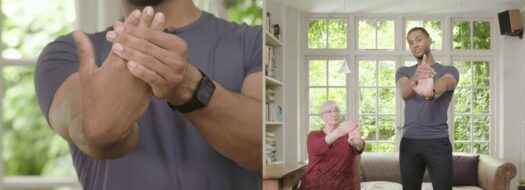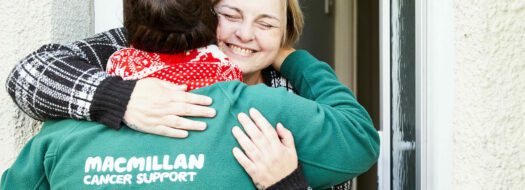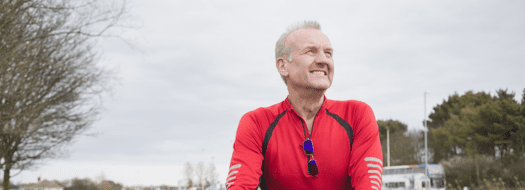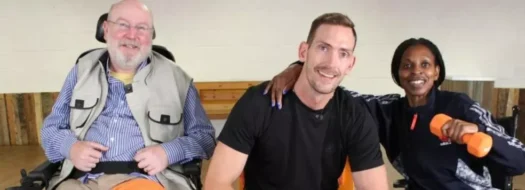Partner Resources – Health condition specific
The following partner resources provide the evidence, advice and support for anyone with a health condition to become more active. If you’d like to explore activities that are suitable for a specific health condition, please enter the condition (ie. ‘cancer’) in the search function. If you’re aware of an activity that is not listed on our website, please get in touch and we’ll be happy to add the details. Please speak to a medical professional if you’re unsure about exercising with an existing health condition.

Arthritis
It can be hard to encourage someone to keep moving when they have arthritis but staying as active as possible can reduce their pain and the symptoms of their condition, and help them to stay independent.
Versus Arthritis offer a range of exercises to help someone with arthritis manage their condition and maintain healthy joints.
Visit Versus Arthritis for information on becoming Active with Arthritis

Cancer
After a cancer diagnosis, many people find that following a healthy, balanced diet and staying active helps give them back a sense of control.
Whether you are supporting someone who’s living with or after cancer, becoming more physically active can have a positive impact on their life.
Visit Macmillan Cancer Support for more information on physical activity and cancer

Dementia
Leading a physically active lifestyle can have a significant impact on the wellbeing of people with dementia.
Physical activity creates valuable opportunities’ to socialise with others, and can help improve and maintain a person’s independence. This is beneficial to both people with dementia and their carers.
Visit Alzheimer's Society for more information on Exercise and Dementia

Diabetes
Being physically active is good for diabetes. Being active makes our body more sensitive to insulin which helps manage diabetes. Activity helps control blood sugar levels and lowers our risk of heart disease and nerve damage.
If you’re supporting someone with diabetes and they’re just starting out with physical activity, or they’re looking for some inspiration and new activities to try out, take a look through the Diabetes UK collection of free resources.
Visit Diabetes UK for more information on being active with Diabetes

Heart Conditions
With a heart problem it can be hard to know how much to do when it comes to being active.
Exercising after a heart attack or surgery may seem like a daunting prospect, but for most people it’s one of the best things to do to help get fitness back and reduce the risk of further heart problems.
Being active makes our heart muscle stronger, manages our blood pressure and lowers cholesterol levels.
Access British Heart Foundation for information on getting active with a heart condition

Lung Conditions
Regular movement is good for our lungs because it increases the strength of the muscles around our lungs and the rest of our body. As we build strength, our muscles will need less oxygen to work too, meaning we will breathe more efficiently while moving.
If you support someone who has a lung condition including chronic obstructive pulmonary disease (COPD) and asthma, being active can help them to improve their quality of life and help manage their condition.
Visit Asthma+Lung UK for more information on keeping active with a lung condition

Mental Health
Many people find that physical activity helps them maintain positive mental health, either on its own, or in combination with other treatments.
Mind, the Mental Health charity offer loads of information about how physical activity can help your mental health, and tips for choosing an activity that works for you, and how to overcome anything that might stop you from becoming more active.
Visit Mind for information on Physical Activity and Your Mental Health

Multiple Sclerosis (MS)
Symptoms of multiple sclerosis can make it hard to exercise. However, research tells us that exercise can help manage multiple sclerosis symptoms, including fatigue, and problems with balance and walking.
MS Society have worked with a qualified personal trainer to create a range of exercises for people with MS. These workouts are designed for different levels of mobility. For local support, advice, therapies and social activities, please visit Kent MS Therapy Centre

Musculoskeletal Conditions (MSK)
Musculoskeletal-related pain has a major impact on individuals and society. ESCAPE-pain is a group rehabilitation programme for people with chronic joint pain that integrates educational self-management and coping strategies with an exercise regimen individualised for each participant.
ESCAPE-pain stands for Enabling Self-management and Coping with Arthritic Pain using Exercise.

Parkinson’s
Being active can help manage Parkinson’s symptoms, and has a positive impact both physically and mentally.
If you’re supporting someone with parkinson’s, Parkinson’s UK have produced a Being Active with Parkinson’s guide which offers advice and helpful tips about getting started and how you can stay active.
Visit Parkinson's UK for more information on becoming Active with Parkinson's

Stroke
After a stroke, starting to move more can be a massive boost to recovery, confidence and wellbeing.
Being active after a stroke can increase muscle strength and improve balance and coordination. Discovers ways to move more at home, adding activity into daily life and tips for anyone who is ready to look for more structured activity or getting back into sport.
Visit Stroke Association for information about getting moving after a stroke

Support for Carers
Carers UK is a supportive community making life better for carers.
Looking after your own needs is so important when you have caring responsibilities. It’s all too easy to become exhausted and burnt out with everything you’re juggling. Carers UK provide the following guidance on how to look after yourself so that you can be stronger and more resilient for those you look after.
 ) located in the address bar to open the share menu.
) located in the address bar to open the share menu.
